Naebang-gasa
Type
Songchukga-ryu (頌祝歌類)
It is one of Gasa-ryu (type) in which a writer wishes for longevity of parents and prosperity of one’s family for their 60th or 70th birthday celebration.
Gisanyeon Maengindeokdamgyeongeun
 Gisanyeon Maengindeokdamgyeongeun / 1989 / 26.2×109.4㎝
The piece starts as “Maengindeokdamgyeongeun Buljeonmyeongdangsinjugyeongeun.” Maengindeokdamgyeong (盲人德談經) is originally one of Seodochang and also referred to as Antaekgyeong (安宅經). The piece is based on the sound of the Buddhist scripture of a blind priest referred as “Pansu,” and some entertaining characteristics are added to it. “Buljeonmyeongdangsinjugyeong (佛說明堂神呪經)” is the scripture that includes prayers to various gods for longevity and elimination of calamity (災厄). This piece was written to wish for the luck to be brought to the family in the new year of Gisa.
Gisanyeon Maengindeokdamgyeongeun / 1989 / 26.2×109.4㎝
The piece starts as “Maengindeokdamgyeongeun Buljeonmyeongdangsinjugyeongeun.” Maengindeokdamgyeong (盲人德談經) is originally one of Seodochang and also referred to as Antaekgyeong (安宅經). The piece is based on the sound of the Buddhist scripture of a blind priest referred as “Pansu,” and some entertaining characteristics are added to it. “Buljeonmyeongdangsinjugyeong (佛說明堂神呪經)” is the scripture that includes prayers to various gods for longevity and elimination of calamity (災厄). This piece was written to wish for the luck to be brought to the family in the new year of Gisa.
Nyuksipnyuyeonsa
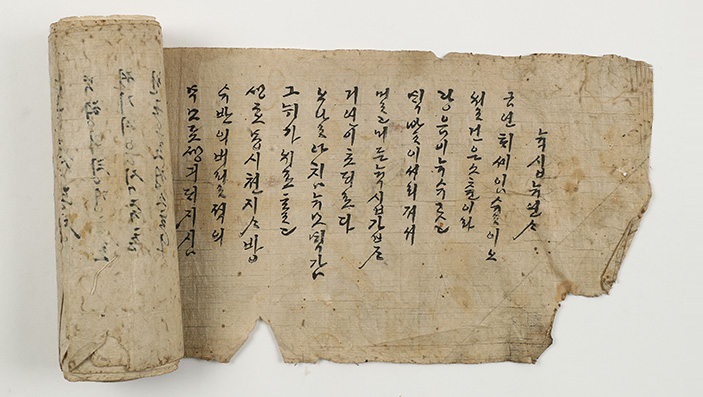 Nyuksipnyuyeonsa / 1922 (the year of Imsul) / 21.3×1106.8㎝
The writer talks about her feelings of the ceremony held by relatives for her 60th birthday. She laments her old age and portrays appreances of her relatives such as them making food.
Nyuksipnyuyeonsa / 1922 (the year of Imsul) / 21.3×1106.8㎝
The writer talks about her feelings of the ceremony held by relatives for her 60th birthday. She laments her old age and portrays appreances of her relatives such as them making food.
Sangbyeokga
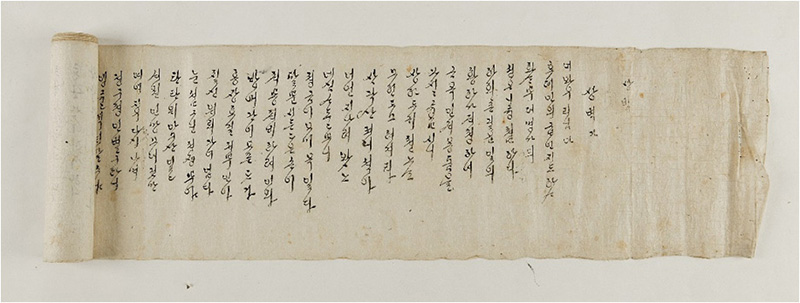 Early 20th century / 23.8×746.0㎝
It is the transcribed copy of Ssangbyeokga written by Jeongbuin (貞夫人) of the Yeonan Yi family (延安李氏) in 1794 (18th year of King Jeongjo). Ssangbyeokga is considered to be the first piece of Naebanggasa. The writer made this song on the spot when her son Ryu Yi-jwa and the oldest nephew Ryu Sang-jo (相祚) both passed the state examination at her age of 58 and King Jeongjo wrote the funeral oration and asked Seungji Yi Ik-un (李益運) to perform Chije (致祭) to commemorate accomplishments (陰德). She sings about offerings on the ceremonial table, hardships in the past, feelings about sweet after bitter (苦盡甘來), the scenery of Chije, and the two boys’ presence and wishes prosperity to last for next generations.
Early 20th century / 23.8×746.0㎝
It is the transcribed copy of Ssangbyeokga written by Jeongbuin (貞夫人) of the Yeonan Yi family (延安李氏) in 1794 (18th year of King Jeongjo). Ssangbyeokga is considered to be the first piece of Naebanggasa. The writer made this song on the spot when her son Ryu Yi-jwa and the oldest nephew Ryu Sang-jo (相祚) both passed the state examination at her age of 58 and King Jeongjo wrote the funeral oration and asked Seungji Yi Ik-un (李益運) to perform Chije (致祭) to commemorate accomplishments (陰德). She sings about offerings on the ceremonial table, hardships in the past, feelings about sweet after bitter (苦盡甘來), the scenery of Chije, and the two boys’ presence and wishes prosperity to last for next generations.
Syuyeongyeongchuk
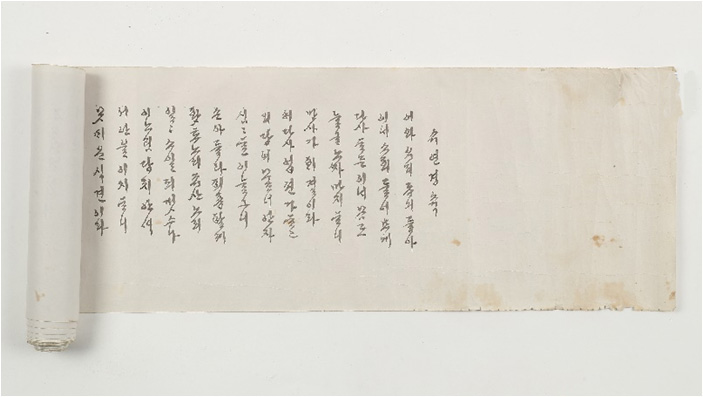 Syuyeongyeongchuk / 1979 (The year of Gimi) / 21.7×921.8㎝
In celebration of the 60th birthday of the younger brother in the family of 7 siblings, the writer portrays the food and participants at the banquet and wishes the best to the brother.
Syuyeongyeongchuk / 1979 (The year of Gimi) / 21.7×921.8㎝
In celebration of the 60th birthday of the younger brother in the family of 7 siblings, the writer portrays the food and participants at the banquet and wishes the best to the brother.
Saengjyogamguga
 Saengjyogamguga / Mid 1900’s / 25.8×1157.2㎝
Saengjogamguga (生朝感舊歌) is written by Yi Sa-ho (李似鎬) from Yangdong village in 1930 when she turned 60. She feels regretful for not having been able to contribute to the country as a woman when her husband refused the idea of holding a birthday ceremony since the country was taken away. Starting with the 60th birthday ceremony, she talks about what she has worked on and done in her life. It is a transcribed copy of the original text.
Saengjyogamguga / Mid 1900’s / 25.8×1157.2㎝
Saengjogamguga (生朝感舊歌) is written by Yi Sa-ho (李似鎬) from Yangdong village in 1930 when she turned 60. She feels regretful for not having been able to contribute to the country as a woman when her husband refused the idea of holding a birthday ceremony since the country was taken away. Starting with the 60th birthday ceremony, she talks about what she has worked on and done in her life. It is a transcribed copy of the original text.
Ssangbyeokga
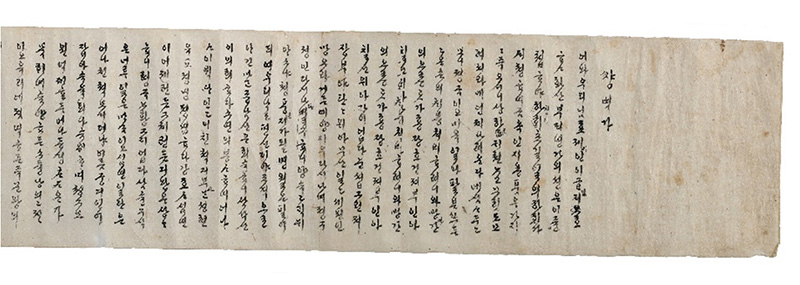 Ssangbyeokga / 1796 / 20.0×596.5㎝
It is the same as above Sangbyeokga, but was transcribed a bit later. “Ssangbyeokga” was actively distributed at the time, and various forms of transcribed copies have been handed down currently.
Ssangbyeokga / 1796 / 20.0×596.5㎝
It is the same as above Sangbyeokga, but was transcribed a bit later. “Ssangbyeokga” was actively distributed at the time, and various forms of transcribed copies have been handed down currently.
Ulhaechukdapga
 Ulhaechukdapga / Early 20th century / 22.0×756.0㎝
The transcription date is “Gyeongjinwonwol Chopalil (the eighth day of the first month of the year of Gyeongjin)” and the transcriber’s information is “Kim So-in.”
Ulhaechukdapga / Early 20th century / 22.0×756.0㎝
The transcription date is “Gyeongjinwonwol Chopalil (the eighth day of the first month of the year of Gyeongjin)” and the transcriber’s information is “Kim So-in.”
Cheonghoegok
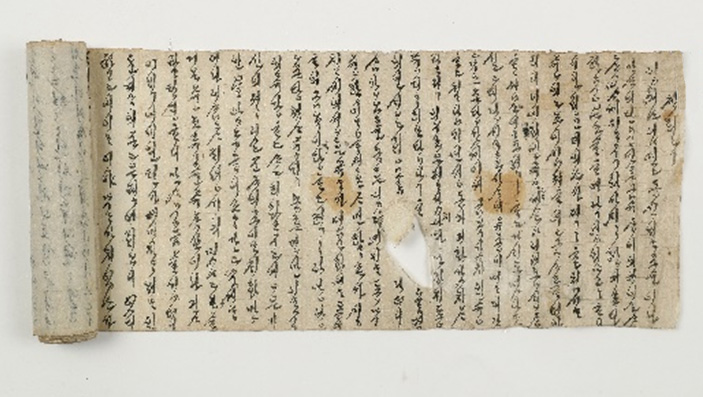 Cheonghoegok / 1926 (the year of Byeongin) / 18.8×198.0㎝
As it was the writer’s 60th birthday celebration on the 17th day of the 10th month in the year of Byeongin, she portrays people who participate in this gathering and list out what she has done in her life.
Cheonghoegok / 1926 (the year of Byeongin) / 18.8×198.0㎝
As it was the writer’s 60th birthday celebration on the 17th day of the 10th month in the year of Byeongin, she portrays people who participate in this gathering and list out what she has done in her life.
Chukshuga
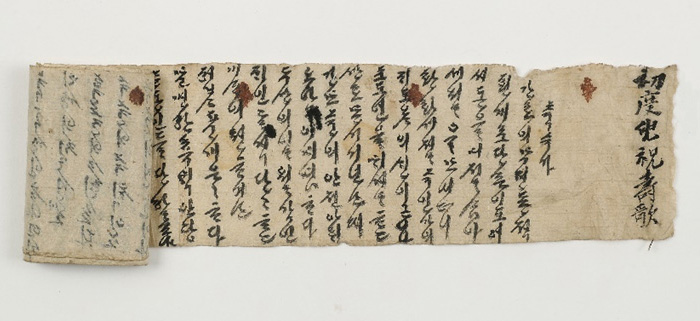 Chukshuga / Early 20th century / 10.4×232.0㎝
It is titled as “Chodoahyeongchuksuga (初度兒祝壽歌)“ in Chinese characters and “Chukshuga” in Korean. It is a song to wish for the health and well-being of the birthday child. “Chodo (初度)” means birthday.
Chukshuga / Early 20th century / 10.4×232.0㎝
It is titled as “Chodoahyeongchuksuga (初度兒祝壽歌)“ in Chinese characters and “Chukshuga” in Korean. It is a song to wish for the health and well-being of the birthday child. “Chodo (初度)” means birthday.
Hoegapgyeongchukga
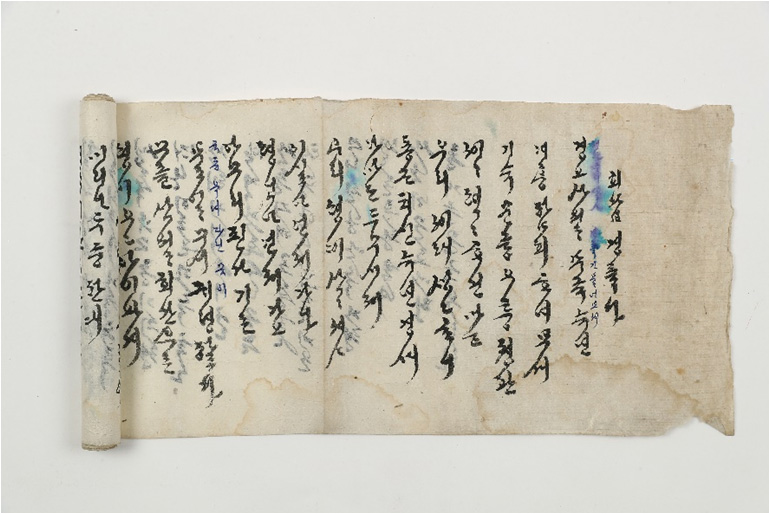 Hoegapgyeongchukga / 1930 (the year of Gyeongo) / 22.8×253.5㎝
4 children celebrate their parents’ 60th birthday, praising their virtues and grace and wishing for their longevity. It portrays people who participate in the feast and the scenery.
Hoegapgyeongchukga / 1930 (the year of Gyeongo) / 22.8×253.5㎝
4 children celebrate their parents’ 60th birthday, praising their virtues and grace and wishing for their longevity. It portrays people who participate in the feast and the scenery.












